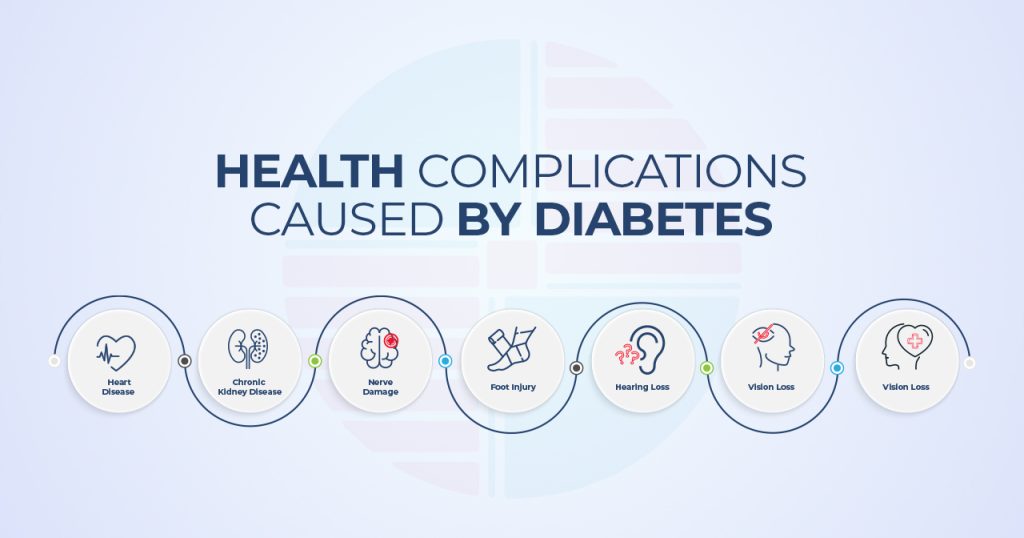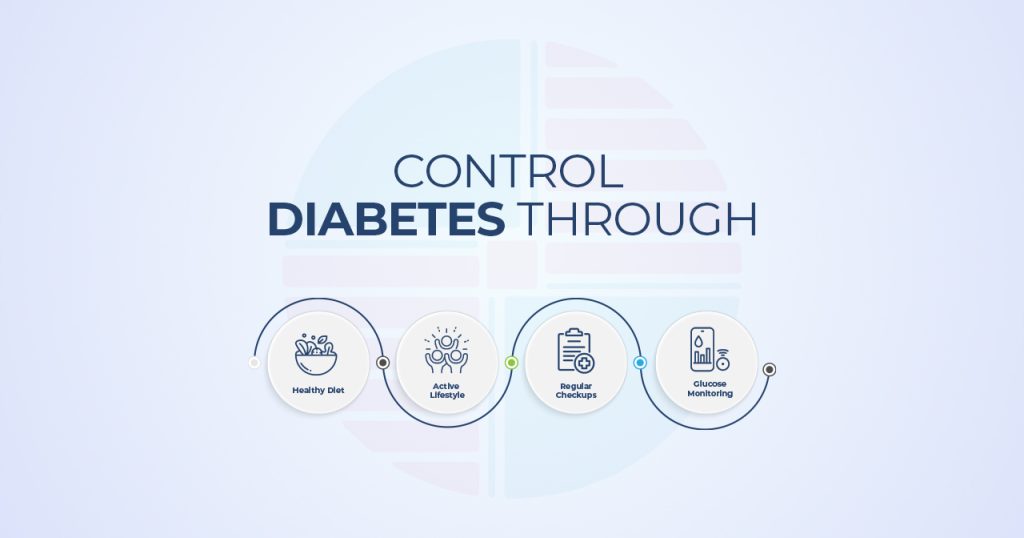Diabetes is a severe body disorder that is irreversible. Yet, it is manageable, and effective management is the key to a healthy, happy, and prosperous life as a patient with diabetes. In this article, we will share the possible complications of diabetics and how to prevent or delay them. This article also addresses some important things to include in your life to control diabetes.
Understand Diabetes
Diabetes is a life-long disease. Type-1 diabetes and type-2 diabetes are the most known variations. The third common type is Gestational diabetes. Type 1 diabetes cannot be prevented. However, type 2 is developed at a later age. The treatment options for type-1 and type-2 diabetes are briefly discussed.
It is also important to know how to control diabetes. And what are the complications of diabetes?
What Causes Diabetes?
There are different causes for both types of diabetes. If, for any reason, the body’s immune system destroys the insulin cells, the body does not produce the required amount of insulin. A person falls ill to type 1. Furthermore, family history, genes, and environmental factors could also be the reason for diabetes type 1.
On the other hand, poor lifestyle, frequent junk food intake, unmanaged stress levels, and weight become a reason for type 2 diabetes. Moreover, changes in hormones can also result in gestational diabetes, but that is not the only factor.
Diabetes is irreversible. However, in diabetes, glucose levels must be managed to avoid possible complications in other major body organs due to the conditions and resulting factors of hyperglycaemia or hypoglycaemia.
Possible Complications of Diabetes
Though diabetes is a complex ailment and results in other health problems, these complications can be delayed or prevented with regular monitoring of changes in the body alongside the management of blood sugar levels. With the progress in age and change in diabetic conditions, the required level of blood glucose changes.
In the following, major diabetic complications are listed and briefly explained.
- Heart Disease
- Chronic Kidney Disease
- Nerve Damage
- Foot Injury
- Hearing Loss
- Vision Loss
- Mental Health
Heart Disease
Diabetes and heart disease go together. Diabetes leads to high blood pressure; in the long run, high blood glucose can damage the blood vessels and arteries. Other options are penned as under.
High Blood Pressure: Increased blood pressure damages arterial walls by increasing the force of blood flow through your arteries. Diabetes and high blood pressure together can significantly raise your risk of heart disease.
Increase In LDL Or Bad Cholesterol: There are two types of cholesterol. Good cholesterol and bad cholesterol. The bad cholesterol plaques up the artery walls and ultimately damages and blocks blood arteries.
High Triglycerides (a kind of fat found in the blood) and either high LDL cholesterol or low HDL (“good”) cholesterol are thought to be linked to artery hardening.
Furthermore, people with diabetes can also experience death due to heart failure. Hence, it is essential to maintain diabetes and good heart health. To ensure regular monitoring of optimal heart performance, go for the following tests as prescribed by a professional diabetologist.
- ECG (Electrocardiogram)
- Echo
- Treadmill Test
Chronic Kidney Disease (CKD)
People with diabetes type-1 and type-2 can fall affected by chronic kidney disease (CKD) and mostly remain uninformed due to lack of proper follow-up. Every 1 in 3 diabetic people have CKD. Therefore, staying in touch with your diabetologist and asking for his professional advice for kidney tests is essential. Simple blood tests and urine samples are used for kidney testing.
High blood glucose and high blood pressure can also damage the kidneys’ veins, ultimately affecting this major body organ. Hence, proper management of blood glucose levels and blood pressure is essential.
Nerve Damage
High blood sugar can eventually lead to diabetic neuropathy, which is nerve damage. Therefore, it is crucial to keep your blood sugar, also known as blood glucose levels, within the target range, as your diabetologist suggests. The nerve damage can result in further complications. The four types of nerve damage are listed below. A person can experience one or more types at a time.
- Peripheral Nerve Damage
- Autonomic Nerve Damage
- Proximal Nerve Damage
- Focal Nerve Damage
Peripheral Nerve Damage: it makes you feel pins, needles or tingling in your feet. Even a random touch or bedsheet touch pains. All of this results in peripheral nerve damage. Peripheral nerve damage can affect hands, feet, legs, and arms. Though it usually initiates from feet, in both at time.
Autonomic Nerve Damage: It affects the major organs like the heart, bladder, stomach, intestine, private organs or eyes. It may result in bladder or bowel problems, nausea, vomiting, or diarrhoea. Issues in light adjustment in eyesight can also result due to this diabetic complication.
Proximal Nerve Damage: Thighs, buttocks, hips, and legs are affected by proximal nerve damage. Sometimes, the chest and stomach can also be damaged by the same. Stomach pain, sitting problems, and pain in the thighs and buttocks can also result from the same.
Focal Nerve Damage: This nerve damage affects one nerve. Often in hand, head, torso, or leg. It may show symptoms of aching behind one eye, tingling in hands or fingers, and weakness while holding something.
Moreover, diabetes can also create complications in vision, hearing, and thinking capacity. As blood glucose levels remain unmanaged, it results in confusion, indecisiveness, and diabetic retinopathy. It is safe to get yourself regularly checked if you are a patient with type 2 diabetes. Also, consult your doctor immediately if you feel any change in your vision and eyes.
How to Control Diabetes?
Now that you know about the possible complications of diabetes, it is essential to know that you must control diabetes. The detailed treatment options for type 1 and type 2 can range from insulin injections to maintaining a healthy lifestyle. However, you must consult your diabetologist for your treatment and living ways.
Some of the tips to improve your lifestyle are as follows.
Healthy Diet
Plan your diabetes meal daily; include non-starchy vegetables and lean meat. Keep an eye on the food labels while grocery shopping and choose food with low GI foods. It would be best to control your carbohydrate intake to maintain your blood glucose levels at optimal.
Active Lifestyle
Being physically active is a healthy lifestyle. Move your muscles around the clock. Do some mental exercises to keep your mind sharp as a knife. Make a sleep routine and stick to it. Healthy sleep will help you to handle your life in better ways. Try to do things that make you happy. For instance, sports, brisk walking, cycling, swimming, mowing a lawn, or your house chores could be the ideal option for active life maintenance and equally helpful in controlling diabetes.
Glucose Monitoring
Maintain a habit of monitoring your blood glucose levels regularly. Consulting your diabetologist can help you to set your target levels of glucose. Also, they will suggest how many times you should monitor it.
Regular Checkups
In addition to blood sugar monitoring and management, regular checkups of your body functions are also essential, per your endocrinologist’s suggestion. Stay in touch with them and discuss every change you experience in your body for timely action.
Doctors Hospital and Medical Centre (DHMC) Diabetes Care
Doctors Hospital and Medical Centre (DHMC) provides comprehensive care for diabetic patients in Lahore, Pakistan. You can contact us at 042 111 223 377.
Bottom Line
Diabetes is a dangerous, irreversible body disease. But still, patients with diabetes can manage and control diabetes to live a long and healthy life. There are certain major possible complications of diabetes, but regular monitoring and consultancy with professional diabetologists can be helpful in timely diagnosis and treatment. DHMC has provided quality patient care and diagnosis for over a couple of decades in Lahore.





